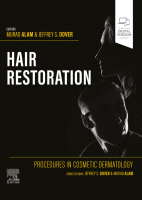Physical Address
304 North Cardinal St.
Dorchester Center, MA 02124

Key points Using clustered, regularly interspaced, short palindromic repeats-CRISPR associated protein 9, hair follicles with high steroid type II 5α-reductase enzyme activity can be genetically altered into follicles with suppressed SRD5A2 enzyme activity, theoretically allowing hair follicles to grow new…

Key points Topical prostaglandin analogs may increase vellus and terminal hair density and stimulate hair follicle activity. Janus kinase inhibitors demonstrate great success in the treatment of alopecia areata, with potential for androgenetic alopecia. Therapies targeting growth-factor regulation offer innovative…

Key points Several laser and light-based therapies, including low-level laser/light therapy, excimer laser, monochromatic excimer light, narrowband ultraviolet B phototherapy, and fractional laser, have been studied for the treatment of androgenetic alopecia. Most research has focused on low-level laser/light therapy,…

Key points Hair transplantation consistently creates natural-appearing hair for men and women with hair loss. Indications for hair transplantation include male and female pattern hair loss, inactive inflammatory scalp dermatoses, and reconstruction of hairlines lost to trauma or surgery. Realistic…

Key points Stem cells are a potential therapeutic option for the treatment of androgenetic alopecia and other forms of hair loss. However, serious adverse events have been previously reported from the use of stem cells for non dermatologic applications. As…

Key points Androgenetic alopecia is the most common form of hair loss and is characterized by progressive reduction and miniaturization of terminal hair follicles on the scalp. Although androgenetic alopecia is benign in nature and often considered part of the…

Key points Patients with androgenetic alopecia may be interested in exploring complementary and alternative medicine, including supplements, specialty diets, and essential oils. There is insufficient evidence to support the use of any complementary and alternative medicine as monotherapy for androgenetic…

Key points The role of inflammation, including T cells, mast cells, prostaglandins, and cytokines, in the pathogenesis of androgenetic alopecia has been studied. Different approaches to address this inflammation have been recommended. Use of anti-inflammatory immunotherapy in androgenetic alopecia is…

Key points Androgenetic alopecia is the most common cause of hair loss and arises from androgen-dependent hair follicle miniaturization on the scalp. Several studies have suggested that follicular microinflammation is implicated in the pathogenesis of androgenetic alopecia, but to date,…

Key points Androgenetic alopecia is the most common cause of alopecia in both men and women; however, approved therapeutic treatment options are limited. Patients should be counseled that treatment of androgenetic alopecia is directed toward prevention of further hair thinning…